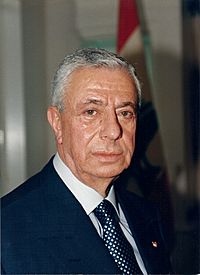Elias Hrawi facts for kids
Quick facts for kids
Elias Hrawi
الياس الهراوي OM, ONC
|
|
|---|---|

Elias Hrawi's Presidential portrait, 1989
|
|
| 10th President of Lebanon | |
| In office 24 November 1989 – 23 November 1998* |
|
| Prime Minister | Selim Hoss Omar Karami Rafic Hariri |
| Preceded by | Selim Hoss (acting) |
| Succeeded by | Émile Lahoud |
| Personal details | |
| Born | 4 September 1926 Zahlé, Greater Lebanon |
| Died | 7 July 2006 (aged 79) Beirut, Lebanon |
| Political party | Independent |
| Alma mater | Saint Joseph University |
| Profession | Businessman, lawyer, politician |
| Religion | Maronites |
| *Hrawi's term was disputed by Michel Aoun until 13 October 1990. | |
Elias Hrawi (Arabic: الياس الهراوي, born 4 September 1926 – died 7 July 2006) was the president of Lebanon. He served in this important role from 1989 to 1998.
Contents
Early Life and Education
Elias Hrawi was born on 4 September 1926, in Hawch Al Umara, Zahlé. His family was wealthy and owned land in the Bekaa Valley. They belonged to the Maronite Christian community.
He got a diploma in commerce in 1947. He also started studying law at St Joseph University, but he did not finish his degree there.
Business Activities
Before he became a politician, Hrawi was a successful businessman. He started a company that exported vegetables to big companies in Switzerland. He also led a sugar beet cooperative in the Beqaa region.
Later, a long civil war (1975-1990) damaged his export business. So, he changed his focus to importing oil instead.
Political Career
Elias Hrawi came from a family that was well-known in politics. He followed his brothers, Georges and Joseph, into politics. In 1972, he was elected to the National Assembly, which is Lebanon's parliament.
From 1980 to 1982, he worked as the minister of public works. During this time, he focused on building new bridges and highways. His goal was to connect all parts of Lebanon.
Hrawi was part of a group of independent Maronite Catholic lawmakers in Parliament. This group wanted to remove armed groups and keep good relationships with both Muslims and Syria.
President of Lebanon
Elias Hrawi became president on 24 November 1989. He was elected by members of parliament at the Park Hotel in Chtoura. This happened just two days after the previous president, René Mouawad, was sadly killed.
As president, Hrawi made important changes to the Constitution. These changes followed the Taif Agreement. This agreement gave more power and influence to Lebanon's Muslim community. This helped to balance power in the country.
The official presidential home, Baabda Palace, was damaged during the civil war. So, Hrawi lived in future prime minister Rafik Hariri's apartment in Beirut. In October 1990, with help from the Syrian army, he managed to get General Michel Aoun to give up. Aoun had been leading a separate government. This step helped start the rebuilding of Lebanon.
On 22 May 1991, Hrawi signed a special agreement with Syria. This agreement said that Lebanon would not let its land be used against Syria's interests. In 1992, he chose Rafik Hariri to be the prime minister. Hrawi often attended cabinet meetings to oversee the government's work.
People had different opinions about Hrawi's time as president. Many praised him for being strong against the fighting groups. They believed he helped end the civil war that had lasted for 15 years. He also helped bring together Lebanon's main political groups. His supporters saw him as a practical leader. They respected him for believing that loyalty to the country should come before loyalty to any religious group. He also worked to promote peaceful living among Lebanon's different religious groups.
However, Hrawi also faced criticism. For example, he tried to pass a law allowing civil marriage, but religious leaders strongly opposed it. Some also criticized him for disarming most Christian and Muslim armed groups, but not Hezbollah, a Shi'a political party. His critics also said he was too supportive of Syria. They argued that the cooperation treaty he signed made Lebanon too dependent on Syria.
He was also criticized for changing the Constitution to extend his term as president by three years in 1995. Some believed this happened after he agreed with Syria on a plan for Emile Lahoud to become president later. Former President Amine Gemayel said that such actions weakened the country's important constitutional rules. Hrawi's presidency ended on 23 November 1998.
After his term, Hrawi later said he regretted extending his time in office.
Personal Life
Elias Hrawi was married twice. He first married Evelyn Chidiac in 1947. They had three children: Rina, George, and Roy. In 1961, he married his second wife, Mona Jammal. They had two children, Zalfa and Roland.
His son-in-law, Fares Boueiz, served as the minister of foreign affairs from 1990 to 1998. Hrawi's older sons have a business that imports petroleum.
Death
Elias Hrawi passed away from cancer at the American University of Beirut Medical Center in Beirut on 7 July 2006. He was 80 years old.
See also
 In Spanish: Elias Hrawi para niños
In Spanish: Elias Hrawi para niños
 | William M. Jackson |
 | Juan E. Gilbert |
 | Neil deGrasse Tyson |

